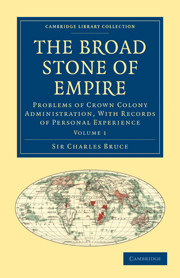 The Broad Stone of Empire
The Broad Stone of Empire Published online by Cambridge University Press: 05 August 2011
I have in the last chapter endeavoured to make it clear that there are inherent in the system of Crown colony government elements of conflict between imperial and local interests, and I have suggested that an advisory Council would be an instrument of conciliation. But, with or without such a Council, the Governor is and must remain the responsible intermediary between the Colonial Office and the local legislature of the Crown colonies. He is the representative of that control from which the American colonies could only emancipate themselves by secession, and from which the self-governing colonies have succeeded in emancipating themselves by the grant of responsible government. I propose before discussing the evolution of the Crown colony legislature to trace the evolution of the Crown colony governor.
The exercise of the power of appointing colonial governors has passed through three principal periods. The American colonies included two groups, royal and proprietary colonies. In the royal colonies the governor was appointed by the King in Council, usually on the recommendation of the Board of Trade; in the proprietary colonies by the proprietor, or proprietary company, subject to confirmation by the Crown. The claims of the Crown under the Stuarts to be the “sole fountain of honour and privilege” led to many conflicts, but resulted in a period during which the Crown exercised the absolute and undisputed power of appointing governors in all colonies.
To save this book to your Kindle, first ensure no-reply@cambridge.org is added to your Approved Personal Document E-mail List under your Personal Document Settings on the Manage Your Content and Devices page of your Amazon account. Then enter the ‘name’ part of your Kindle email address below. Find out more about saving to your Kindle.
Note you can select to save to either the @free.kindle.com or @kindle.com variations. ‘@free.kindle.com’ emails are free but can only be saved to your device when it is connected to wi-fi. ‘@kindle.com’ emails can be delivered even when you are not connected to wi-fi, but note that service fees apply.
Find out more about the Kindle Personal Document Service.
To save content items to your account, please confirm that you agree to abide by our usage policies. If this is the first time you use this feature, you will be asked to authorise Cambridge Core to connect with your account. Find out more about saving content to Dropbox.
To save content items to your account, please confirm that you agree to abide by our usage policies. If this is the first time you use this feature, you will be asked to authorise Cambridge Core to connect with your account. Find out more about saving content to Google Drive.